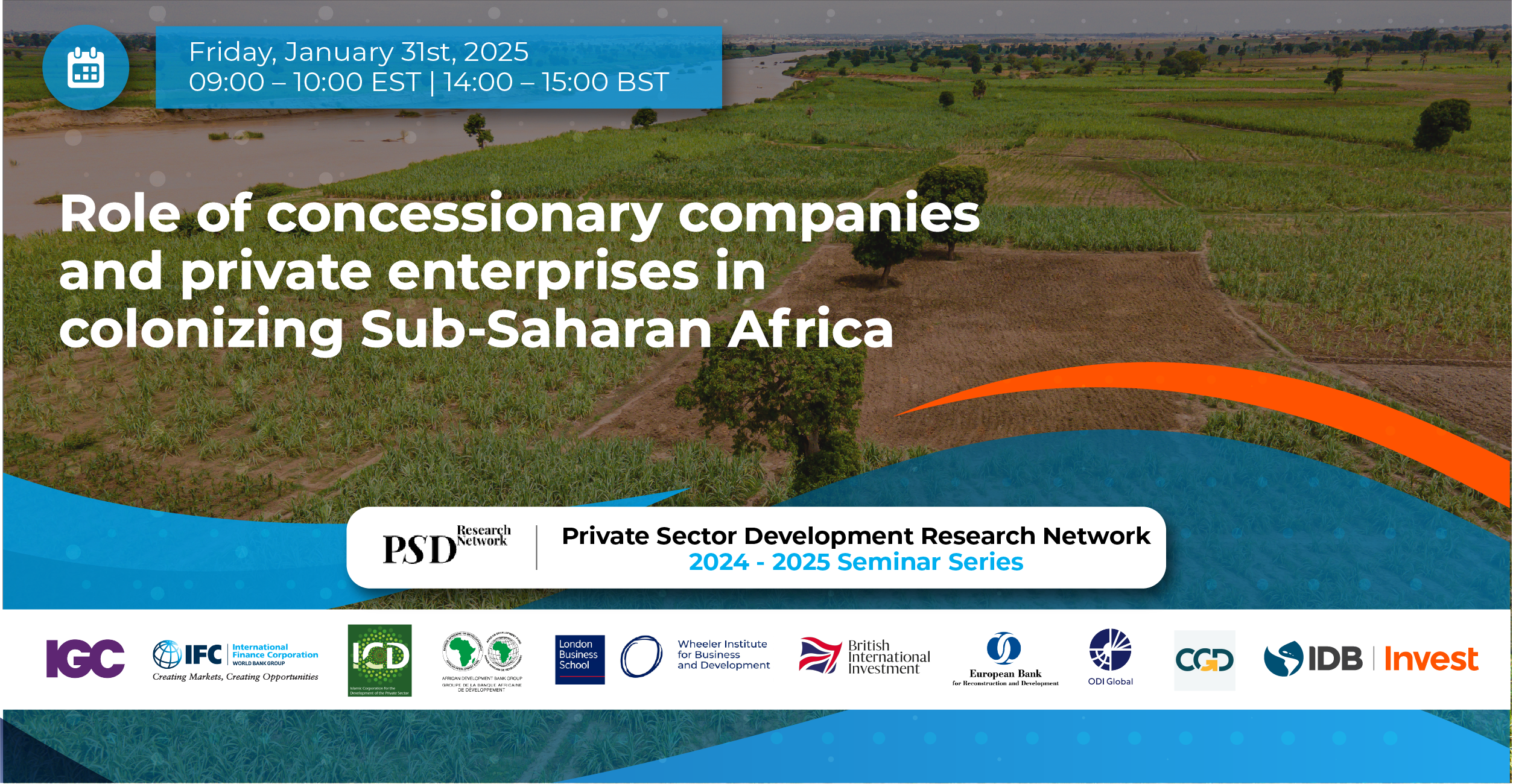
Role of concessionary companies and private enterprises in colonizing Sub-Saharan Africa
Organized by the Private Sector Development Research Network
Hosted by the Wheeler Institute for Business and Development
Moderated by Tiago Martinho, Executive Director, Wheeler Institute for Business and Development
Friday, 31st of January 2025 from 9-10am EST / 2-3 pm UK time
CLICK HERE TO READ ABOUT KEY INSIGHTS DISCUSSED DURING THE SEMINAR
ABOUT THE SEMINAR
The seminar will present groundbreaking research on the impact of concession companies in Sub-Saharan Africa across all colonial periods. The study maps the universe of these companies, detailing their operations (plantation agriculture, charter companies, forestry, mining, trading), practices (like the use of forced labor, oppression, and genocide), and investments (in roads, railroads, schools, and health). The study highlights the widespread nature of the concessionary paradigm across imperial powers and colonial eras, addressing a significant gap in recent economic research.
The presentation will explore the characteristics of concessions over time and across colonial powers, examining their geographical distribution and evolution. It will delve into the legacy of the concessionary paradigm on contemporary development, using spatial Regression Discontinuity Design (RDD) analyses to reveal the heterogeneous impacts of different company types and practices.
The seminar will discuss findings on the relationship between extractive practices and lower socio-economic outcomes, as well as the positive correlation between historical investments and current development. Regional aggregates accounting for local spillovers and noise will be presented, showing correlations between company activities and various development indicators.
This research aims to bring attention to the often-neglected role of private concessionary capital in colonization, encouraging further study into the interplay between colonial states and companies, the implications of outsourcing colonization, and the broader agency of imperialism.
ABOUT THE SPEAKERS
Elias Papaioannou
Professor of Economics; Academic Director, Wheeler Institute for Business and Development; Fellow of the British Academy
Dr. Papaioannou is the academic director of the Wheeler Institute for Business and Development and a professor of economics at London Business School. His research focuses on international finance, political economy, applied econometrics, growth, and development.
Dr. Papaioannou held the Varian Visiting Professor of Economics position at MIT in 2019/2020. His career includes roles at the European Central Bank, Dartmouth College, and Harvard University. He completed his PhD at London Business School in 2005, following a Master’s in Public Policy and Administration from Columbia University and an LL.B. from the University of Athens.
His work has earned him several prestigious awards, including a consolidator ERC grant in 2018, the 2013 European Investment Bank Young Economist Award, and the 2005 European Economic Association’s Young Economist Award. As a research affiliate of the Centre for Economic Policy Research, Dr. Papaioannou’s research has been published in leading peer-reviewed journals and book volumes.
Dr. Papaioannou regularly consults with international organizations and institutional investors on macroeconomic developments in the EU and Greece, bridging academic research with practical economic insights.
Details of Dr. Papaioannou’s work can be found here.
Etienne Le Rossignol
Postdoctoral Researcher, University of Namur
Etienne Le Rossignol is a Postdoctoral Researcher at the University of Namur in Belgium, supported by a Marie Sklodowska-Curie Actions – H2020 scholarship. He previously held a Research Fellow position at the London Business School from November 2020 to July 2022. Dr. Le Rossignol completed his PhD in Economics at Paris 1 Panthéon Sorbonne in 2021.
His research focuses on Economic History, Political Economy, Development Economics, and Culture. Dr. Le Rossignol’s work explores the origins and consequences of various institutions and norms, including property rights, trust, and beliefs. He has a particular interest in examining the cultural and economic legacies of colonialism in sub-Saharan Africa.
As an empirical researcher, Dr. Le Rossignol’s ongoing projects in Development Economics and Economic History utilize both contemporary and archival data from sub-Saharan Africa. His work on Culture incorporates ethnographic and global survey data. Through his research, Dr. Le Rossignol contributes to our understanding of the complex interplay between historical events, institutional development, and contemporary economic outcomes.
Details of Dr. Le Rossignol‘s work can be found here.





